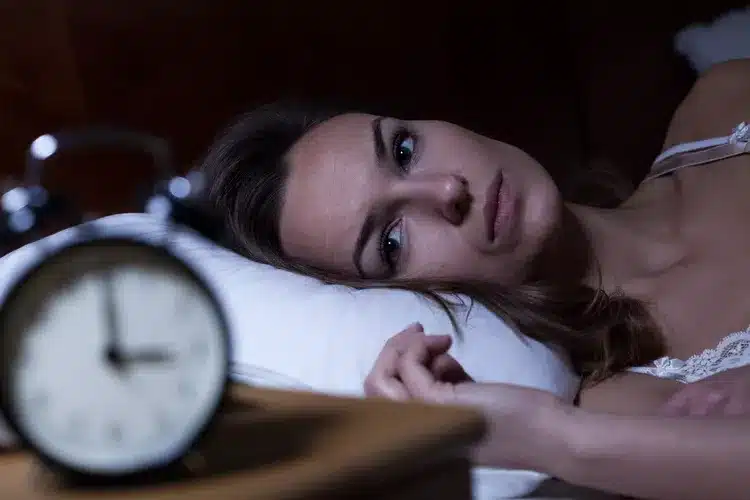We’ve all been there staring at the ceiling at 2 a.m., wondering why our mind won’t let us sleep. But when the anxiety that’s keeping you up at night is all about sleep itself, you’re probably dealing with sleep anxiety. It’s more common than you might think, and while it can feel like an endless loop of worry and sleeplessness, the good news is that it’s totally manageable. Let’s dive into what sleep anxiety is, why it happens, and most importantly, how you can overcome it to get the rest you deserve.
So, What Is Sleep Anxiety?

Sleep anxiety is pretty much what it sounds like worry or fear about going to bed and falling asleep. Instead of your bed being a place of peace and relaxation, it starts to feel like a battlefield. Maybe you’re afraid you won’t fall asleep at all, or you’ll wake up a dozen times during the night, or you won’t get enough rest to tackle the next day. Sound familiar?
For some people, it can even go a step further into something called somniphobia a fear of sleeping itself. You might feel like something bad will happen while you sleep, or you need to stay on alert. Whatever the reason, these thoughts spiral and make it almost impossible to drift off.
What Does Sleep Anxiety Look Like?
You might be dealing with sleep anxiety if you notice these symptoms:
Emotionally:
- Feeling dread or fear when bedtime approaches.
- Constantly worrying about how much (or how little) sleep you’ll get.
- Feeling irritable or frustrated during the day.
Physically:
- Racing heartbeat or palpitations.
- Tense muscles or clenched jaw.
- Sweating, trembling, or even digestive issues.
Behaviorally:
- Staying up late to avoid “failing” at sleep.
- Relying on caffeine or energy drinks during the day to power through.
- Overanalyzing every little thing about your sleep schedule.
Why Does Sleep Anxiety Happen?
There’s no single answer, but sleep anxiety often stems from a combination of things:
- Underlying sleep disorders: Conditions like insomnia, sleep apnea, or restless legs syndrome (RLS) can make it harder to sleep and that stress builds over time.
- Mental health struggles: Anxiety, PTSD, ADHD, or depression can ramp up bedtime worries.
- Lifestyle habits: Too much caffeine, scrolling on your phone right before bed, or an irregular sleep schedule can mess with your ability to unwind.
- Trauma or major stress: Big life changes, work pressure, or relationship struggles can all spill over into your nights.
And let’s not forget the cycle: You can’t sleep because you’re anxious, and you’re anxious because you can’t sleep. It’s frustrating, right?
How Does Sleep Anxiety Impact Your Life?

Let’s be real poor sleep doesn’t just leave you tired. Sleep anxiety can:
- Mess with your focus and mood during the day.
- Make you more likely to catch colds or other illnesses (thanks, weakened immune system).
- Increase your risk of chronic conditions like heart disease, diabetes, and obesity.
- Fuel mental health struggles like depression or, yep, more anxiety.
It’s a domino effect that can feel overwhelming. But don’t worry, there are ways to stop the cycle.
How to Break Free from Sleep Anxiety
The first step is understanding that this is something you can tackle. Let’s go over a few proven strategies.
1. Master Good Sleep Hygiene
Think of sleep hygiene as the habits that set you up for a successful night’s rest. Here’s what works:
| Do This | Skip This |
|---|---|
| Go to bed and wake up at the same time. | Using your phone or laptop in bed. |
| Keep your bedroom cool, dark, and quiet. | Drinking caffeine late in the afternoon. |
| Wind down with a calming activity like reading. | Eating a heavy meal close to bedtime. |
| Get out of bed if you can’t sleep after 20 minutes. | Lying awake, worrying about not sleeping. |
2. Challenge Those Negative Thoughts
Let’s be honest most of the anxiety around sleep comes from our own heads. Replace “I’ll never sleep tonight” with “Even if I don’t sleep great, I’ll still get through tomorrow.” Shift your focus from perfection to progress.
Here’s another tip: Schedule “worry time” during the day. Jot down all your concerns so you’re not unpacking them at bedtime.
3. Try Relaxation Techniques
Anxiety likes to keep your body in overdrive, so it helps to calm your nervous system.
- Breathing exercises: Inhale for 4 seconds, hold for 4, and exhale for 4.
- Progressive muscle relaxation: Start at your toes, tense each muscle group for a few seconds, then let it relax.
- Mindfulness meditation: Focus on the present moment and let go of the day’s worries.
4. Consider Cognitive Behavioral Therapy for Insomnia (CBT-I)
CBT-I is like the gold standard for treating sleep anxiety and insomnia. It teaches you to:
- Change the way you think about sleep.
- Stick to a structured bedtime and wake-up time.
- Build habits that make your bed a place for rest not stress.
It’s a game-changer for many people and typically involves just 4–8 sessions.
5. Medication: A Short-Term Tool
For some, short-term use of sleep aids or anti-anxiety meds might help break the cycle. Always talk to a doctor first, though—they’ll guide you on what’s safe and effective.
Take Back Your Nights
You don’t have to let sleep anxiety run the show. With the right strategies—like good sleep hygiene, relaxation techniques, and possibly CBT-I, you can break the cycle and start getting the rest you need.
And remember, it’s okay to ask for help. Sleep is too important to struggle through alone. Here’s to sweet dreams ahead.
Symptoms of Sleep Anxiety
Emotional symptoms:
- Fear or dread about bedtime.
- Irritability or frustration.
- Poor concentration during the day.
Physical symptoms:
- Racing heartbeat or palpitations.
- Muscle tension or jaw clenching.
- Sweating, digestive distress, or trembling.
Behavioral symptoms:
- Avoiding bedtime altogether.
- Over-reliance on stimulants (e.g., caffeine) or depressants (e.g., alcohol).
Causes and Risk Factors
Sleep anxiety can arise from multiple factors, including:
- Medical conditions: Insomnia, sleep apnea, restless legs syndrome (RLS), or chronic pain.
- Mental health disorders: Anxiety, PTSD, depression, or ADHD.
- Trauma: Past traumatic experiences related to nighttime or safety.
- Stressful lifestyle: High-pressure work, relationship issues, or major life changes.
- Poor sleep hygiene: Irregular schedules, excessive screen time, or heavy meals before bed.
Effects of Sleep Anxiety on Health
Chronic sleep anxiety can take a toll on your health, leading to:
- Increased risk of mental health disorders, such as depression.
- Daytime fatigue and poor cognitive function.
- Physical issues like high blood pressure, obesity, and weakened immunity.
- Heightened risk of chronic illnesses like diabetes and heart disease.
How to Treat Sleep Anxiety
Thankfully, sleep anxiety is treatable. Here are key strategies and therapies that can help:
1. Cognitive Behavioral Therapy for Insomnia (CBT-I)
CBT-I is the gold-standard treatment for sleep anxiety and insomnia. It helps by:
- Addressing negative thoughts about sleep.
- Developing a structured sleep schedule.
- Incorporating relaxation techniques like progressive muscle relaxation.
2. Medications
Doctors may prescribe:
- Anti-anxiety medications: To alleviate acute symptoms.
- Sleep aids: For short-term relief (used with caution).
- Supplements: Like melatonin, if suitable for your condition.
3. Lifestyle Adjustments
- Improve sleep hygiene: Follow a consistent sleep schedule, limit caffeine, and create a soothing bedtime routine.
- Reduce stress: Engage in mindfulness meditation, yoga, or journaling.
- Exercise regularly: Physical activity can help release tension and promote better sleep.
Top Tips for Managing Sleep Anxiety
Establish Good Sleep Hygiene
| Dos | Don’ts |
|---|---|
| Go to bed and wake up at the same time daily. | Use your phone or laptop in bed. |
| Create a cool, dark, and quiet bedroom. | Consume alcohol or caffeine close to bedtime. |
| Practice relaxation techniques before sleep. | Stay in bed if you can’t fall asleep. |
| Engage in calming activities like reading. | Eat heavy meals late at night. |
Cognitive Strategies
- Challenge negative thoughts: Replace “I’ll never sleep!” with “My body knows how to rest.”
- Limit worry time: Schedule 15 minutes during the day to address anxieties.
- Practice gratitude: Focus on positive moments from your day before bed.
Physical Techniques
- Breathing exercises: Inhale for four counts, hold for four counts, exhale for four counts.
- Body scans: Relax each muscle group progressively, starting from your toes.
When to See a Doctor
If sleep anxiety persists for more than three months or severely impacts your daily life, consult a healthcare provider. Seek immediate medical attention if you experience:
- Panic attacks or severe distress at night.
- Symptoms of underlying sleep disorders like sleep apnea.
- Persistent feelings of depression or hopelessness.
FAQs on Sleep Anxiety
1. Can sleep anxiety go away on its own?
For some, sleep anxiety may resolve with lifestyle adjustments. However, chronic sleep anxiety often requires professional intervention, such as CBT-I or medications.
2. How long does CBT-I take to work?
CBT-I typically requires four to eight sessions. Many people notice improvements within a few weeks.
3. Can supplements like melatonin help?
Melatonin can aid in resetting sleep patterns, but it’s not a long-term solution. Always consult a doctor before starting supplements.
4. Should I use sleep aids for sleep anxiety?
Sleep aids can provide short-term relief but aren’t recommended for long-term use due to potential dependency.
5. Are there natural remedies for sleep anxiety?
Yes! Herbal teas, aromatherapy (lavender), and mindfulness practices can complement other treatments.
Conclusion
Sleep anxiety doesn’t have to control your nights—or your life. By understanding its causes, recognizing the symptoms, and applying effective treatments like CBT-I and sleep hygiene improvements, you can break free from the anxiety-sleep cycle. Don’t hesitate to reach out to healthcare professionals for personalized guidance. With time and the right approach, peaceful, restorative sleep is within reach.
References
Cleveland Clinic. “Sleep Anxiety: Causes and Treatment.” https://my.clevelandclinic.org
National Institute of Mental Health (NIMH). “Anxiety Disorders.” https://www.nimh.nih.gov
American Psychological Association (APA). “Cognitive Behavioral Therapy for Insomnia.” https://www.apa.org
Sleep Foundation. “The Relationship Between Anxiety and Sleep.” https://www.sleepfoundation.org
Mayo Clinic. “Insomnia and Anxiety: The Connection.” https://www.mayoclinic.org


